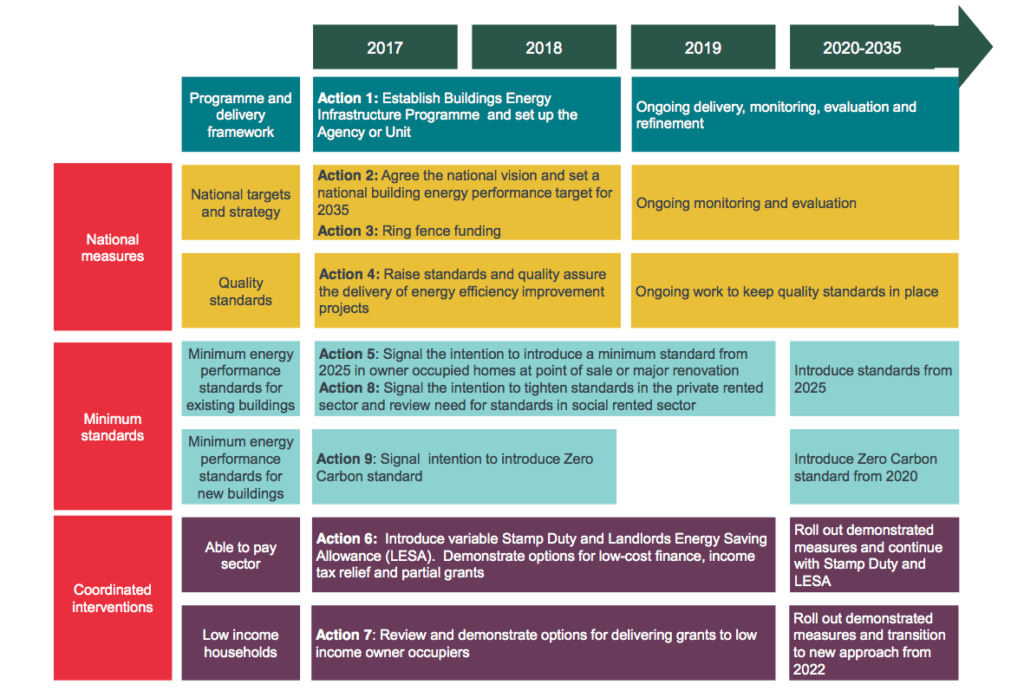
Report lays out vision for ‘ambitious’ UK energy efficiency plan
Jocelyn Timperley
09.27.17Jocelyn Timperley
27.09.2017 | 12:01amAn ambitious new infrastructure programme is needed to help to decarbonise the UK’s buildings – and a sweeping new plan shows what it could look like.
The proposals, developed by Frontier Economics for a group of 28 NGOs, thinktanks, businesses and trade bodies, would also boost the economy and help to meet legally-binding carbon and fuel poverty targets, its backers say.
In a new report, they present a range of policies which could be taken up or trialled by the government in order to move forward on energy efficiency.
Policy void
It has long been recognised that the government has failed to produce sufficient energy efficiency policies to keep it on track with its carbon targets.
A number of energy efficiency schemes have been closed without a replacement in recent years.
These include the Warm Front, a taxpayer funded grant programme, which was closed in 2013 and the Green Deal, which provided loans to help homeowners improve the energy efficiency of their property and was closed in 2015.
The Zero Carbon Homes target for new homes, which was set to come into force in 2016, was also scrapped in 2015, while the Energy Company Obligation, which requires energy providers to subsidise home insulation, has been downsized.
As a result, the annual number of major energy efficiency measures installed in homes dropped by 80% between 2012 and 2015, from 1.74m down to just 340,000. The government’s own projectionsshow emissions from homes are in line for a 10% increase by 2035 under its current set of policies.
Meanwhile, the UK remainsoff track to meet its legally-binding fourth and fifth carbon budgets. The government has long promised to fill this policy gap with a new carbon plan – which would be expected to include energy efficiency measures. This is now due to be published in October.
New action
It is against this backdrop that today’s report present a broad set of proposals to put the UK’s energy efficiency efforts back on track.
This includes a public investment programme to incentivise improvements to households’ energy performance, as well as new regulation.
Under the plan, all UK homes would be required to meet a minimum energy performance by 2035. The report suggests this long term target could be set at Energy Performance Certificate (EPC) band C. Around 19m properties fall short of this, equivalent to 71% of the UK’s 27m homes.
Several different publicly financed schemes would be used to push the EPC rating of homes up to this band. Low-income owner-occupiers would get fully subsidised retrofits, while there would be a 50% subsidy for council and housing association homes. Private properties let to low-income tenants would get a 33% subsidy.
The report also suggests a range of demonstration schemes are set up in the “able to pay” sector to help homeowners retrofit their houses to a C rating. These trials could use partial grants, income tax relief along the lines of the ‘Cycle to Work’ scheme or below-market loan interest rates.(The last of these would differ from the Green Deal by offering lower interest rates. It would also be demonstrated and refined before scaling it up and would drop Green Deal’s “Golden Rule”, which said expected savings must be at least as great as the cost of implementing the energy efficiency measure.)

Rolls of loft insulation ready to install in homes in Kirklees, UK Credit: Andrew Aitchison / Alamy Stock Photo
Meanwhile, the Landlords Energy Saving Allowance should be reintroduced. This gave landlords an income tax allowance for energy efficiency upgrades of their properties, but closed in 2015,.
Together, these public investment programs would require around £1.7bn per year up to 2030, the report says. This would put funding broadly in line with the level seen in 2012 and 2013, the report says.
A further proposal is to link the Stamp Duty paid when buying a home to the property’s energy performance, rather than just to the price paid for the home. This revenue neutral policy would allow energy efficiency to be incorporated into property values by shifting up or down the Stamp Duty depending on the energy efficiency rating of the house. Others have suggested this before but it has never been implemented.
In addition, regulatory changes – cost neutral to the government – would increase the required minimum EPC rating for private rented housing from E to D, and set a minimum E rating for owner-occupied homes at the point of sale.
Finally, the report wants the scrapped zero carbon homes target to be reintroduced, starting 2020. This would tighten building regulations for newly constructed homes in line with the analysis and definition previously proposed by Zero Carbon Hub.
Although new houses are generally built to be far more energy efficient than older stock, the report argues they might still need costly retrofits to reach a zero carbon rating in future, while poorer designs from the outset could mean higher savings are not achievable.
It also notes that while it has focussed on domestic buildings, the government’s energy efficiency programme must ultimately cover energy performance and efficiency in all buildings, including commercial and public buildings.
Try harder
Together, says the report, these policies would form an energy efficiency infrastructure programme which would make a major contribution to delivering clean growth while ensuring the UK meets its fourth and fifth carbon budgets.
At the same time, it would help to meet fuel poverty targets, deliver benefits to people’s health and embed lower running costs into the value of properties.
A report released earlier this month by the UK Energy Research Council (UKERC) found “cost-effective” investments could save a quarter of the energy used by households. This would be worth an average £270 per household per year and come on top of savings already made through energy efficiency.
Speaking to Carbon Brief, Lord Deben – former Tory minister and chairman of the Committee on Climate Change (CCC), who wrote a foreword for the report – says that while the UK has “tried” before on energy efficiency, “we haven’t tried sufficiently hard”. He says:
“We haven’t spent enough time on it; we haven’t been as involved in this as we ought to be, but we’ve also tried and made mistakes, and the great thing about making mistakes is that you can learn from them, and this report helps you to learn from them.”
Infrastructure programme
Alongside this programme to support energy efficiency measures, the report also suggests a new overarching “Buildings Energy Infrastructure Agency” to implement it.
This could be established jointly by HM Treasury, the Department for Business, Energy and Industrial Strategy (BEIS), and the Department for Communities and Local Government (DCLG), the report says. However, Lord Deben points out that the departments with an interest in energy efficiency span even wider than this, from the Department of Health (DH) to the Department of Work and Pensions (DWP).
This agency would track progress towards energy efficiency goals and help ensure that all home improvements are delivered to high levels of workmanship. Its remit should cover heat as well as energy efficiency, in all buildings in the domestic and non-domestic sectors. Running costs would sit at around £10-15m a year, the report estimates.
Lord Deben says this cross-departmental agency would be “very apposite” for a government which has so far “been better than many in understanding that there’s a real problem of division between departments”. He tells Carbon Brief:
“So all these departments have an interest in it, and at the moment we don’t have a way in which savings in one department can be placed against spendings in other departments; that’s what an infrastructure agency might well be able to do: show that many of these programs are net savings to the government.”
It’s worth noting here that the National Infrastructure Commission, set up in 2015 to advise the UK on its infrastructure challenges, has previously said it plans to consider energy efficiency in its work. It is due to set out its vision later this year of the infrastructure needed by the UK up to 2050.
Next steps
A series of actions would be required before 2020 to set the proposed programme in motion, the report says. The figure below shows its proposed timeline.

Action Plan proposed to deliver the Buildings Energy Infrastructure Programme. Source: Frontier Economics 2017, Affordable Warmth, Clean Growth.
As the figure shows, by the end of 2018, the independent Buildings Energy Infrastructure Agency should be established, the proposed long term National Energy Performance Target for 2035 set and the needed funding ring-fenced.
Meanwhile the policies set out by the report (and in the timeline above) should be laid out over the coming two years and rolled out by the end of 2019.
Future policy
The CCC has repeatedly emphasised that energy efficiency is a key area of decarbonisation, where new national policy is badly needed.
Back in 2016, chancellor Philip Hammond announced £7.2bn of new support for the construction of new homes along with other measures for housing, R&D, and economic infrastructure, but did not mention the energy performance of buildings. This year’s Spring budget also failed to mention energy efficiency.
Today’s report sets out the idea of a new energy efficiency agency being established, and presents a set of proposals for boosting energy efficiency in the UK, centred around raising the minimum energy performance of all houses to EPC level C by 2035 and increasing public investment in retrofits.
It remains to be seen how far support for energy efficiency measures will be included in the UK’s upcoming low carbon plan and infrastructure assessment.

